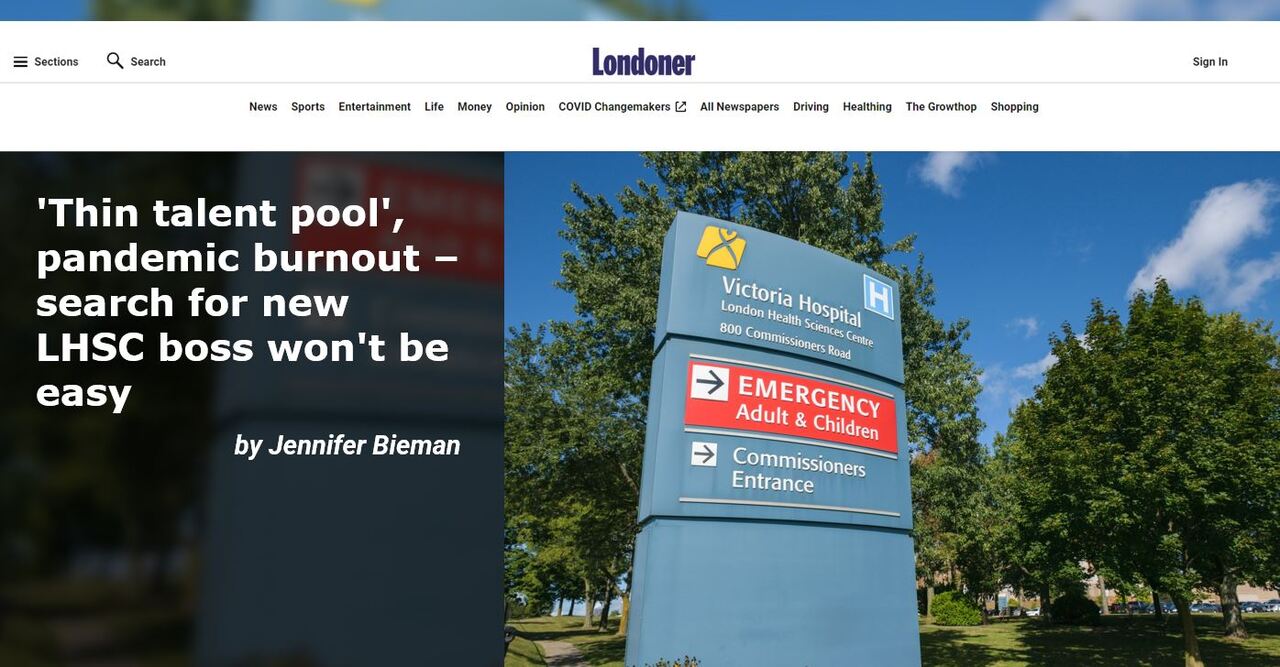Pandemic burnout in the already small pool of Canadian health executives is making the search for a new London Health Sciences Centre boss even more challenging.
This article was originally published by Londoner. Click here to view the original article.

Pandemic burnout in the already small pool of Canadian health executives is making the search for a new London Health Sciences Centre boss even more challenging, the hospital’s recruiter says.
The LHSC board of directors has hired Boyden Canada, an executive search and consulting firm, to lead its hunt for a replacement for former chief executive Paul Woods, a process that is expected to take about four months.
LHSC’s status as a major teaching hospital, regional acute-care leader and medical research hub means it has specific requirements for its new chief executive, Boyden partner Jim Stonehouse said.
“It calls for skill sets that are fairly rare, quite frankly, in the country. There are only a small number of academic health-care organizations in Canada and a smaller number in Ontario,” he said.
“It requires somebody who has got, ideally, experience in overseeing a fairly large and complicated organization that has many moving parts.”
Boyden is in the first phase of recruitment, reviewing hospital documents on the chief executive’s responsibilities and getting a sense of the kind of leader LHSC is looking for.
In the second phase, the job will be posted publicly and Boyden will approach qualified candidates who may be interested in the position, Stonehouse said. Internal candidates can come forward for consideration, but are generally not approached by recruiters to avoid unfairness, he said.
The pressure of responding to the COVID-19 pandemic in the health sector over the last 18 months has made the already difficult task even more daunting, Stonehouse said.
“Recruitment in health care has never been more difficult. You’ve got people retiring at a remarkable rate. . . . It’s a relatively thin talent pool across the country. Just because one can identify talent, doesn’t necessarily mean that they will be interested,” he said.
“COVID has proven to be a substantial issue for health care recruiting for leadership roles. . . . People are really exhausted and many are at the end of their tether, so that’s the backdrop against which you do the recruitment. I think the implication is many people who might otherwise have been interested in opportunities, not just at LHSC, are pausing and really taking stock of what matters.”
Boyden is in charge of recruiting and vetting candidates and hopes topresent a list of anywhere from seven to 11 people for the board’s search committee to review. The committee will cut down the list to a shorter roster of final candidates.
The recruiter is on hand to answer questions about candidates, schedule interviews and help the committee develop interview guidelines so they can get a full assessment of each finalist, Stonehouse said.
Boyden was also contracted to help St. Joseph’s Health Care London search for a replacement for president and chief executive Gillian Kernaghan, who retired earlier this month. Roy Butler, a former vice-president at the hospital, was chosen by the board of directors as her successor.
LHSC’s board chose Boyden to lead the search after requesting proposals from companies in the recruitment field, board chair Phyllis Retty said in a statement.
The hospital would not disclose the financial terms of its contract with Boyden, but said the “costs are in line with other recruitments at this level in the public sector.”
Meanwhile, the board has extended the contract of interim chief executive Jackie Schleifer Taylor to Dec. 31, or until a permanent replacement has been appointed, Retty said in a statement.
Schleifer Taylor was appointed to the post in January after Woods was fired by the board amid revelations he travelled to the U.S. to see family repeatedly during the pandemic, despite provincial and federal warnings against international travel.
Woods is seeking $3.5 million in damages from LHSC, including $1.4 million in compensation, $1 million damages for alleged harm to his reputation and $100,000 for unproven breaches of Ontario’s Human Rights Code.

